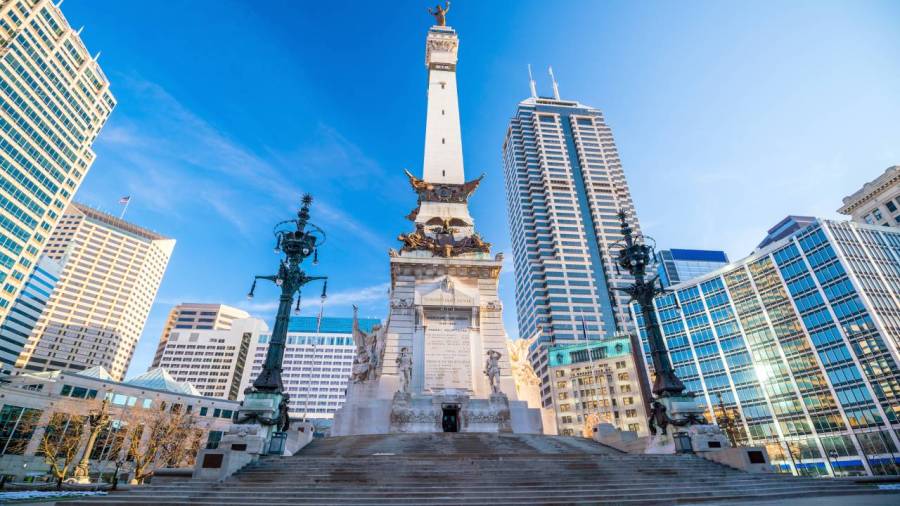House Committee hears debate on downtown Indy tax

INDIANAPOLIS — Republican lawmakers introduced a bill to roll back last year’s legislation that allowed the City-County Council to approve a tax to raise $5.5 million per year starting in 2025 that supporters claim will clean up downtown Indianapolis, keep it safer and address homelessness.
House Bill 1199 was heard before the House Ways & Means Committee.
The bill would undo enabling legislation slipped into the state’s most recent two-year budget last spring that led to an ordinance heard and adopted by the Council in December to tax property owners within the Mile Square.
The EED revenues would pay for downtown cleaning efforts, additional public safety technology and police funding, promotion and homeless outreach services and operation of a low barrier shelter to provide housing, programs and referrals for those from across Indiana who come to Indianapolis without a place to live and are left to survive on the streets and in shelters.
Opponents claim that the EED enabling legislation was rushed through in the waning hours of last spring’s General Assembly without public comment.
Between the passage of the budget and the introduction of the local ordinance two days after the November General Election for Indianapolis mayor and City-County Council Members, the proposed tax was widely reported in the media and discussed in downtown stakeholder meetings facilitated by Downtown Indy Inc. and the Indy Chamber of Commerce.
”The coalition that I represent had no idea that this tax was going through and many of the representatives didn’t even know it was slipped into the bill at the last minute,” said Corey Wood of DefendDowntown.com.
The Indiana Apartment Association and downtown apartment complex owners argued that an additional tax on their properties would raise rents by $360 or more per year and drive down apartment occupancies.
”Anytime you increase taxes you always worry about driving folks away from the downtown area and I think a vibrant downtown is good for all business owners and residents,” said Wood. ”The city has a $1.5 billion budget but if they want to prioritize those issues, they very well could.”
After the pandemic of 2020 emptied downtown of office workers and rioting wrecked the city’s core in the spring, the Mile Square was deserted with shuttered businesses, boarded up windows and streets littered with debris occupied by persons without shelter.
Federal financial assistance was funneled to Downtown Indy Inc. by the Hogsett administration and, in turn, crews set about cleaning sidewalks and alleys, erasing graffiti, enhancing security camera systems, paying for police overtime and designated beats and assigning outreach workers to circulate among the homeless and channel them into shelters and other programs.
After several years of negotiations, the EED enabling legislation was the General Assembly’s answer to partnering with Indianapolis in addressing the homelessness issue that plagues not only Marion County residents but recently paroled offenders from Indiana’s prison system as well as Hoosiers from outside the metro area who arrive in the State Capitol with no place to stay.
While Mayor Joe Hogsett has set aside $12 million to construct a low-barrier homeless shelter and services facility on the near east side, lawmakers decided that for Indianapolis to be eligible for $20 million in potential state funding for that shelter, the city would need an ongoing revenue stream such as the one provided for in the Economic Enhancement District.
Residential property owners would be taxed a flat $250 fee while hotels, apartment complexes and business and office building owners would be charged a sliding rate, reviewable by the EED’s eight-member appointed board and approved by the Council.
”For those of us who think of this as our neighborhood and not just a tourist destination and not just a development target zone, this is our neighborhood,” said Perry Mihalakos, whose condominium overlooks the 500 block of Mass Ave. ”This is our neighborhood and we want to clean it up and we want to make it safer and better and this seems to be the best way to go forward.”
Mihalakos was one of 31 supporters, including residents, city and police officials and apartment developers, who were slated to testify against the HB 1199 rollback.
“It’s disappointing and confusing. We thought that we had something in place that offered some real promise,” he said. ”If we’re gonna solve this problem, we have to direct resources, we have to be able to pull ourselves together. If we’re going to solve the problem of the unhoused on our sidewalks, our streets, if we’re going to solve the problems of our need for more safety, then we’re going to have to pool our resources and tighten our belts and this is what is called for. I think this is what a citizen requires.”
When the bill returns for a second hearing before the committee, lawmakers will debate among themselves before deciding whether to report the bill for Senate consideration.

Comments are closed.